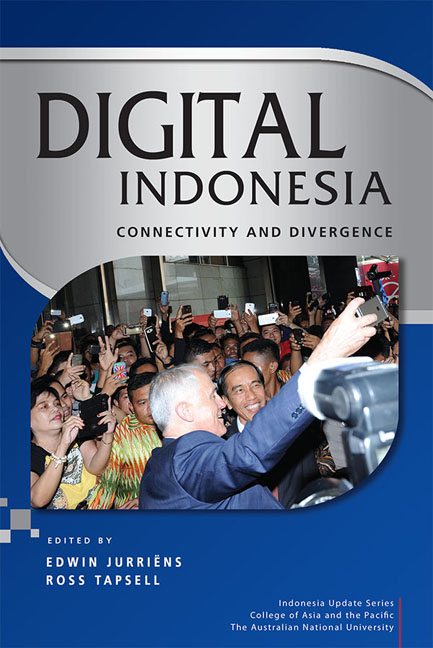Book contents
- Frontmatter
- Contents
- Tables
- Figures
- Contributors
- Acknowledgments
- Glossary
- Map of Indonesia
- 1 Challenges and opportunities of the digital ‘revolution’ in Indonesia
- PART 1 CONNECTIVITY
- 2 An insider's view of e-governance under Jokowi: political promise or technocratic vision?
- 3 Mobile phones: advertising, consumerism and class
- 4 The political economy of digital media
- PART 2 DIVERGENCE
- PART 3 IDENTITY
- PART 4 KNOWLEDGE
- PART 5 COMMERCE
- Index
- Indonesia Update Series
3 - Mobile phones: advertising, consumerism and class
from PART 1 - CONNECTIVITY
Published online by Cambridge University Press: 12 January 2018
- Frontmatter
- Contents
- Tables
- Figures
- Contributors
- Acknowledgments
- Glossary
- Map of Indonesia
- 1 Challenges and opportunities of the digital ‘revolution’ in Indonesia
- PART 1 CONNECTIVITY
- 2 An insider's view of e-governance under Jokowi: political promise or technocratic vision?
- 3 Mobile phones: advertising, consumerism and class
- 4 The political economy of digital media
- PART 2 DIVERGENCE
- PART 3 IDENTITY
- PART 4 KNOWLEDGE
- PART 5 COMMERCE
- Index
- Indonesia Update Series
Summary
One of the major challenges facing scholars seeking to investigate political and ideological developments in contemporary Indonesian public life is the coincidence of two significant phenomena with distinct historical roots: regime change in 1998, and changes to the media technologies by which public life is produced, circulated and sensed. For the most part, scholars of Indonesian politics have sought to negotiate this challenge by treating new media technologies as a neutral factor that has played no role in shaping political and ideological developments. Major studies of contemporary Indonesian politics sketch a continuum on which regime change in 1998 and decentralisation in 2001—but not technological developments—feature as major turning points shaping the contours of public life.
In this chapter, I develop an alternative historical framework for analysing the ideological implications of the spread of new media. I argue that we cannot hope to understand the role of technology by positioning the digital in a post-authoritarian frame—the predominant one for analysing political change in contemporary Indonesia. There is little doubt that post-authoritarianism is useful for studying the intricacies of the formal dimensions of Indonesian democracy in the twenty-first century, but it should not be accorded primacy in the study of digital change. When we hitch the study of digital Indonesia to an agenda that seeks to understand emerging forms of political organisation by looking at society through the lens of elections, parties, social movements and states, we forgo the opportunity to use the lens of media technologies. In other words, we forgo the opportunity to understand political change through theories of media change.
This chapter draws on such theories to consider how changes in media technologies precipitate political change. It does so by focusing on an important part of digital Indonesia as we know it today: the mobile phone. The vernacular term for a mobile phone in Indonesia is ‘HP’— short for ‘hand phone’. In this chapter I discuss both the historical roots and the social and political implications of the rapid uptake of mobile phones in Indonesia over the last few years.
- Type
- Chapter
- Information
- Digital IndonesiaConnectivity and Divergence, pp. 38 - 55Publisher: ISEAS–Yusof Ishak InstitutePrint publication year: 2017



